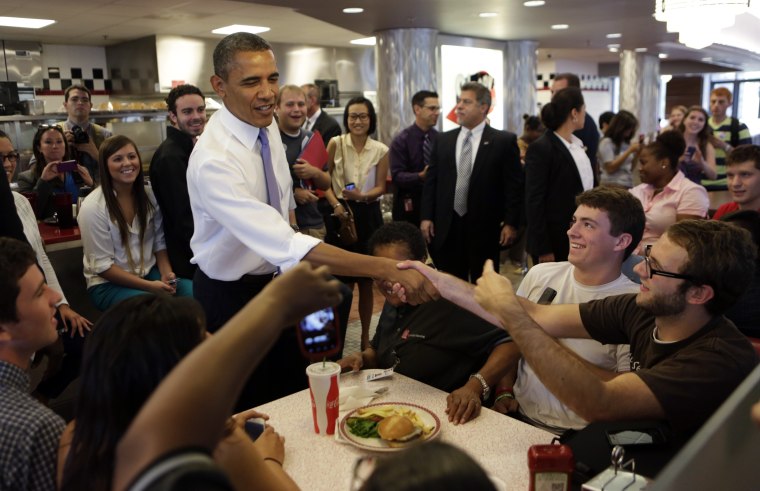Election night was proof that young voters still believe in President Obama. In 2008, they came out in the millions to support Obama. But recent studies showed young voters were less interested in the presidential election in 2012, citing a Pew poll that showed only 18% of voters under 30 were paying attention to the cycle—down 35% from four years ago.
But first-time voter Adrienne Edwards, 21, disagreed with the talk about an enthusiasm gap. "The possibility of a Romney presidency scared too many of us to the polls," she said. Edwards, a philosophy, politics, and economics major at the University of Pennsylvania, said that while the long election cycle and the constant coverage exhuasted her, it also made her feel complled to go out and vote. "I think many other young people felt the same way," she said.
Edwards was right: exit poll data from Tuesday night's election shows the majority of voters between the ages of 18-29 voted for Obama, 60% to 37%.
First-time voter Dan Gorman, 21, from the University of Rochester, said he was surprised to learn the youth turnout in 2012 was as strong a showing as four years ago. "This year, college students of multiple political persuasions seemed much less enthusiastic and regarded the candidates with some derision," Gorman said. "Mitt Romney wasn’t a viable conservative, or President Obama was an ineffectual leader—I’d hear these complaints on a daily basis. As I filled out my absentee ballot, I assumed the youth vote would be lower than in 2008."
Compared to 2008, youth turnout rose one percentage point. Support from young voters was key for Obama in battleground states. In 2008, young voters in Ohio, Florida, Virginia and Pennsylvania elected Obama with a wide margin. This year was no different:
- Ohio: 63% of 18-29 year-olds voted for Obama, as opposed to just 35% who chose Romney
- Florida: young voters overwhelmingly selected Obama, 66% to 32%
- Virginia, 61% of young voters chose Obama over the 36% who chose Romney
- Pennsylvania, young voters chose Obama over Romney, 63% to 35%
Although the race in Florida is still too close to call as of Friday afternoon, according to NBC, these four states have the potential to give President Obama 80 electorate votes total.
According to the Center for Information and Research on Civic Learning and Engagement (CIVIC), the youth vote in those four states was the key to the 2012 race: "Assuming that Florida is called for President Obama in 2012, then Ohio, Virginia, Pennsylvania, and Florida will be states in which young voters were essential to the President’s reelection coalition. In those states, if Governor Romney had won half of the youth vote, or if young voters had stayed home entirely, then Romney would have won instead of Obama."
Gorman said he voted based on issues such as climate change and marriage equality, and thinks many young voters did the same. "Apparently, complaining about candidates does not necessarily translate into low turnout at the polls," he said. "Perhaps young people voted because of specific issues that mattered to them, and not so much out of affection for the candidates."
For Edwards, the election was important because of the economy. "Coming out of college, I have a great deal at stake depending on the swing of the economy. I was interested to hear how either candidate would address economic issues," she said.
But both campaigns veered off into social issues that dominated the conversation, and proved to be a key deciding factor for Edwards and other young voters. Edwards cited Rush Limbaugh's attacks on Sandra Fluke and the right-wing's racial insensitivity as factors in her decision. "I voted for [Obama] because most of what he did in the first term I agreed with, and the Republican party seemed out of touch and therefore couldn't gain my trust," she said.
